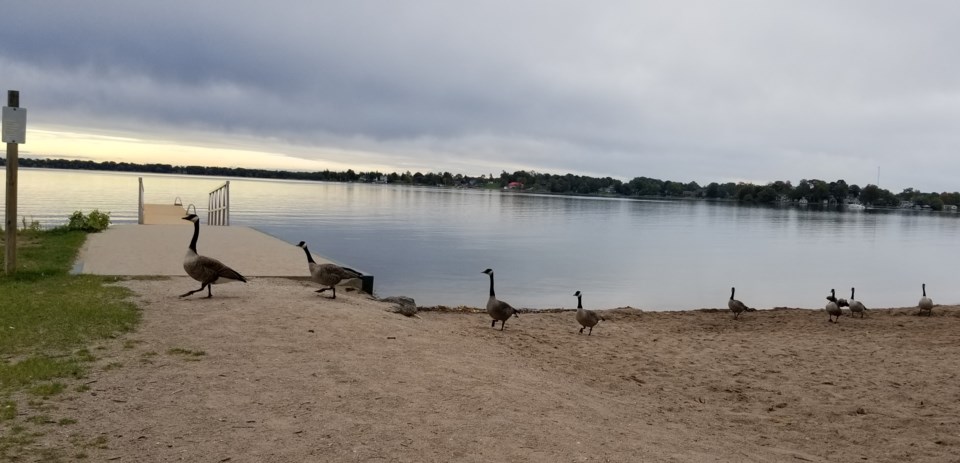With swim advisories on the rise in Orillia, one city councillor pitched shooting down the local geese population and distributing the meat to the less fortunate as a two-bird, one-stone solution to tackling water quality issues at local beaches.
“I’m happy to work with staff and any council (members) who would approve setting up a controlled hunt,” Coun. Whitney Smith said at Monday’s council meeting. “It doesn’t have to be every day. It could be managed … and we could certainly, at least, eliminate some of the geese that are coming around.”
Geese were in the crosshairs of several council members during a discussion on rising swim advisories, and they assigned the water fowl blame for increasing bacteria levels in local waterways and the subsequent beach closures through the summer.
Hunters are allowed to harvest hundreds of geese over the course of the hunting season, Smith pointed out, adding the meat could be used to provide food for locals in need.
“We can take the harvest that we potentially get, if that was ever something we could go forward with, and we could give that meat to local … families in need,” she said. “Geese, their breasts and tenderloins and the whole body, produce quite a lot of meat. I’ve harvested 21 geese already this season, and we’re only a few weeks in, and … one whole side of my freezer is already full.”
The swim advisory issue has been on council’s docket a few times in the past year, after Coun. Tim Lauer asked city staff to report back with potential solutions to rising advisories at local beaches.
Staff have yet to pitch a council-sanctioned wild goose hunt.
High E. coli levels can often be attributed to human or seagull activity, explained staff, who consulted with academics like McMaster University’s Dr. Tom Edge in drafting their report.
“What Dr. Edge explained to me is, typically, in an urban environment, you’re either looking at … human sources, or you have seagull issues. Seagulls (have) very, very potent E. Coli in their dung,” said Greg Preston, the city’s director of waste management and environmental compliance.
While members of council pointed to large gatherings of geese at city shorelines, staff proposed carrying out a microbial source tracking program through 2025 that could help determine the specific cause of rising bacteria levels — an idea council agreed to forward to budget deliberations this fall.
If approved at budget, samples will be taken during dry and wet conditions to test for human, dog, seagull and goose feces at local beaches and stormwater release sites, with the aim of identifying specific E. coli sources at Couchiching Beach Park, Moose Beach and Portage Bay.
“The microbial source water tracking will help us hone in on what is the source of it. Is it the seagulls? Is it human sourced?” Preston asked. “(It’s) a comprehensive plan to look at it, and that’s what we’re proposing.”
Between 2018 and 2023, there have been 39 public swim advisories at local beaches, with the 10 advisories in 2023 representing a 37.93 per cent increase over the previous four-year average.
Given the rising numbers, and the fact the issue was initially brought up last summer, Lauer was frustrated action hadn’t taken place yet.
“I’m actually a little disappointed that this is taking so long,” he said. “The source tracking — I thought we were going to get at that this year, but by the sounds of it, we’re just going to approve it, and we approve it a budget, and then get at it next year, which means no results for another year, which puts us two years down the road.”
Staff explained microbial source tracking is an “expensive” endeavour that requires budget approval but added the program will provide valuable data to help implement the appropriate solutions.
“We have a lot of hypotheses here with geese. It could be seagulls, could be human — the microbial source tracking will actually help (tell) us where it’s coming from,” Preston said. “I understand very well … the concern about doing it faster. We will have very good information from this study next year, and we’ll be really able to hone in our focus.”
The microbial source tracking project was discussed Monday alongside a comprehensive review of the city’s stormwater operations and maintenance plans, to be considered during 2025 budget deliberations.



